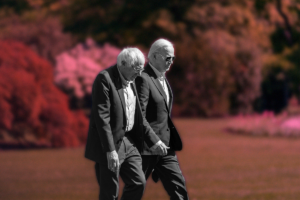New York Times Smears Bernie Sanders in Its Latest Lurch to the Right
A new report inexplicably ties the recent shooting in Alexandria, Va., to belligerent "Bernie Bros." Randy Bayne / CC BY-NC-ND 2.0
Randy Bayne / CC BY-NC-ND 2.0
By Paul Blest / AlterNet
After Donald Trump’s stunning victory last November, major media outlets have enjoyed a surge in donations from concerned citizens hoping to restore a Fourth Estate that buckled and finally collapsed under the weight of the 2016 election. “Trump is the best thing to ever happen to the Times’ subscription strategy,” executive editor Dean Baquet told CNN in February. “Every time he tweets it drives subscriptions wildly.”
It’s not a little dispiriting, then, that the New York Times has used its new appointment as a leader of the #Resistance to run some of the most reactionary opinion writing this side of the Weekly Standard. With its new subscription dollars, it’s hired a known climate denier and racist in Bret Stephens, published a conspiracy theorist in Louise Mensch, and started an ill-fated column asking people to say something nice about Donald Trump, to offer just a few examples.
By and large, these takes have been confined to the paper’s op-ed page. But Wednesday’s shooting in Alexandria, which left Republican whip Steve Scalise of Louisiana critically injured, has produced one exceptionally irresponsible piece of reporting. In a piece titled “Attack Tests Movement Sanders Founded,” journalist Yamiche Alcindor suggests that Sanders’ supporters, if not the Vermont senator himself, have somehow invited this kind of violence. (The shooter, James Hodgkinson, had volunteered for the Bernie Sanders presidential campaign in Iowa.)
Alcindor writes:
But long before the shooting on Wednesday, some of Mr. Sanders’s supporters had earned a belligerent reputation for their criticism of Hillary Clinton, the Democratic Party and others who they believed disagreed with their ideas. Sanders fans, sometimes referred to derogatorily as “Bernie Bros” or “Bernie Bots,” at times harassed reporters covering Mr. Sanders and flooded social media with angry posts directed at the “corporate media,” a term often used by the senator.
The Times also quotes Harlan Hill, a Trump surrogate who has called Sanders’ attacks on the president a “passive justification” for the shooting, despite the fact that his preferred politician has casually urged “Second Amendment people” to take care of Hillary Clinton, encouraged audiences to beat up protesters at rallies, and so on. But in her piece, Alcindor devotes just a single sentence to the many instances Trump has encouraged acts of violence.
What Alcindor doesn’t note, interestingly, is that Hodgkinson alluded to Trump’s Russia problems in several posts on his now-deleted Facebook page, and called the president a “traitor.” There’s obviously considerable overlap between Sanders supporters and Democrats who are especially preoccupied with the Russia scandal, but Sanders himself has been critical of the focus many in the party have placed on the issue. If Hodgkinson’s heinous act is somehow representative of Democratic socialism, isn’t the same true of those who think (not without some merit) that Russia intervened on Trump’s behalf?
The ideological sibling to this argument is a curdled, right-wing definition of the “left” best expressed by the National Review’s Kevin D. Williamson, who wrote that the “only thing resembling a genuine totalitarian movement in American politics is the progressive camp from which emerged the man who shot Steve Scalise.” (In the immediate aftermath of the shooting of Gabby Giffords in 2011, Williams used his column to shill for gun manufacturers and lament that liberals like Keith Olbermann would dare to blame Sarah Palin.)
The same criticisms that have been lobbed at so-called “Bernie Bros” for a year were launched at Barack Obama supporters in 2008, Clinton backers during the same race and again last year, and at Howard Dean devotees before both of them. On the other side, mainstream Republicans have long been dismissive of Ron Paul supporters for similar reasons. These fierce intra-party battles go back generations—Taftbros physically fought Eisenhowerbots at the 1952 Republican National Convention.
When actor Wendell Pierce attacked a Sanders supporter last year, there were no thinkpieces about the ferociousness of Clintonistas. Nor should there have been; Pierce is just one man. Ascribing his actions to Clinton or the nearly 17 million people who voted for her in the primary would be spectacularly wrongheaded. Human life is politics, and as such, people sometimes let their emotions get the best of them; that doesn’t mean the politics they got swept up in is at fault.
A mass shooting is something else altogether; any attempts to tether it to a political movement are as myopic as they are disingenuous. It’s imperative for the press to cast a critical eye on politicians, and Sanders is no exception. But linking him, Clinton, or any politician to the violent actions of their supporters does a disservice to readers hoping to understand Hodgkinson’s crimes.
The real takeaway, as Katie McDonough argued at Fusion on the day of the shooting, should be that people who commit domestic violence should not be able to buy guns. As has been the case in so many other mass shootings, Hodgkinson had a history of abusing women, including partners and his own daughter.
“We live in a country that lets domestic abusers keep their guns,” she wrote. “We are a country that never learns its lesson, and we are letting them kill.”
Your support matters…Independent journalism is under threat and overshadowed by heavily funded mainstream media.
You can help level the playing field. Become a member.
Your tax-deductible contribution keeps us digging beneath the headlines to give you thought-provoking, investigative reporting and analysis that unearths what's really happening- without compromise.
Give today to support our courageous, independent journalists.








You need to be a supporter to comment.
There are currently no responses to this article.
Be the first to respond.